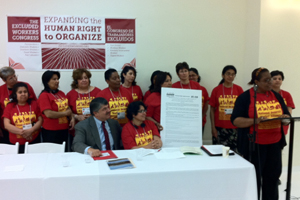Excluded Workers, AFL-CIO Build Addition to the House of Labor

The Excluded Workers Congress called on the AFL-CIO to let them in—and got the beginnings of a welcome at their conference in New York this week. President Rich Trumka signed two new partnerships, with the domestic worker and guest worker groups. Photo: Eduardo Soriano-Castillo.
“Excluded workers” called on the AFL-CIO to let them in—and got the beginnings of a welcome. At their conference in New York this week, 250 members and organizers from the nine sectors of the Excluded Workers Congress vowed to “expand the human right to organize and collectively bargain.” Excluded workers, who formed their Congress at the U.S. Social Forum last year, are workers who either by law or by practice are excluded from the right to organize in the United States.
Agricultural workers and domestic workers were written out of labor law in the 1930s. Taxi drivers lost employee status and became independent contractors in the 1980s. Welfare recipients are required to “work off” their welfare grants and even their food stamps.
The nine sectors of the Congress are domestic workers (National Domestic Workers Alliance), farmworkers (Coalition of Immokalee Workers, Comité de Apoyo de Los Trabajadores Agrícolas), taxi drivers (alliances in New York, LA, and Philadelphia), restaurant workers (Restaurant Opportunity Center), day laborers (National Day Laborer Organizing Network), guest workers (Alliance of Guest Workers for Dignity), workers from right-to-work states (Southern Human Rights Organizers’ Network), workfare workers (Community Voices Heard), and formerly incarcerated workers (All of Us or None).
They share three things in common: They are exempt from nearly all workplace rights and benefits. They represent the most vulnerable members of our society: women, immigrants, and people of color. And they’re organizing and fighting without the benefit of legal or contract protections.
In testimonials workers told of their workplace struggles and their vision for what was possible if excluded workers stood together regardless of the law.
Ketny-Jean Francois, a former workfare worker, looked straight at AFL-CIO President Rich Trumka and said, “Mr. Trumka, we work next to union workers every day. We are forced to wear tags that say ‘non-employee.’

SUPPORT LABOR NOTES
BECOME A MONTHLY DONOR
Give $10 a month or more and get our "Fight the Boss, Build the Union" T-shirt.
“Besides the dignity this takes away from us, we’re also undercutting your union members. Does this seem right to you?” asked Francois, co-chair of the Community Voices Heard board of directors. “We need you, Mr. Trumka, to take an official stand.”
Trumka shared his own story of organizing without legal protection during the Mine Workers’ nine-month strike against Pittston Coal in 1989, where workers occupied a coal tipple. “We were also told that according to the law we couldn’t fight back or strike,” Trumka said. “Well, guess what? We did it anyways.”
He pointed to the New York City Central Labor Council’s commitment to the New York Taxi Workers Alliance, whose membership is majority South Asian, and the partnership they signed in 2006. With today’s “sharp attacks on immigrant workers,” he said, such partnerships become even more important.
The AFL-CIO signed an agreement promising support to the National Day Laborer Organizing Network in 2006.
Trumka signed two new partnerships Tuesday, with the domestic worker and guest worker groups, to chants of “Si se pudo!” (Yes, we did) and “Ole, ole, ole, ole.”
The agreement says the AFL-CIO will educate its rank and file and build mutually beneficial partnerships.
The AFL-CIO also extended legal, media, and technical support to the partner organizations of the Excluded Workers Congress.
"Years ago the unions viewed us as competition and cheap labor undercutting their members,” said Daniel Castellanos, lead organizer of the National Guest Workers Alliance. “This agreement signals an acknowledgment by the unions that in the race to the bottom we all lose. Together, we will raise the working standards of all workers.”





